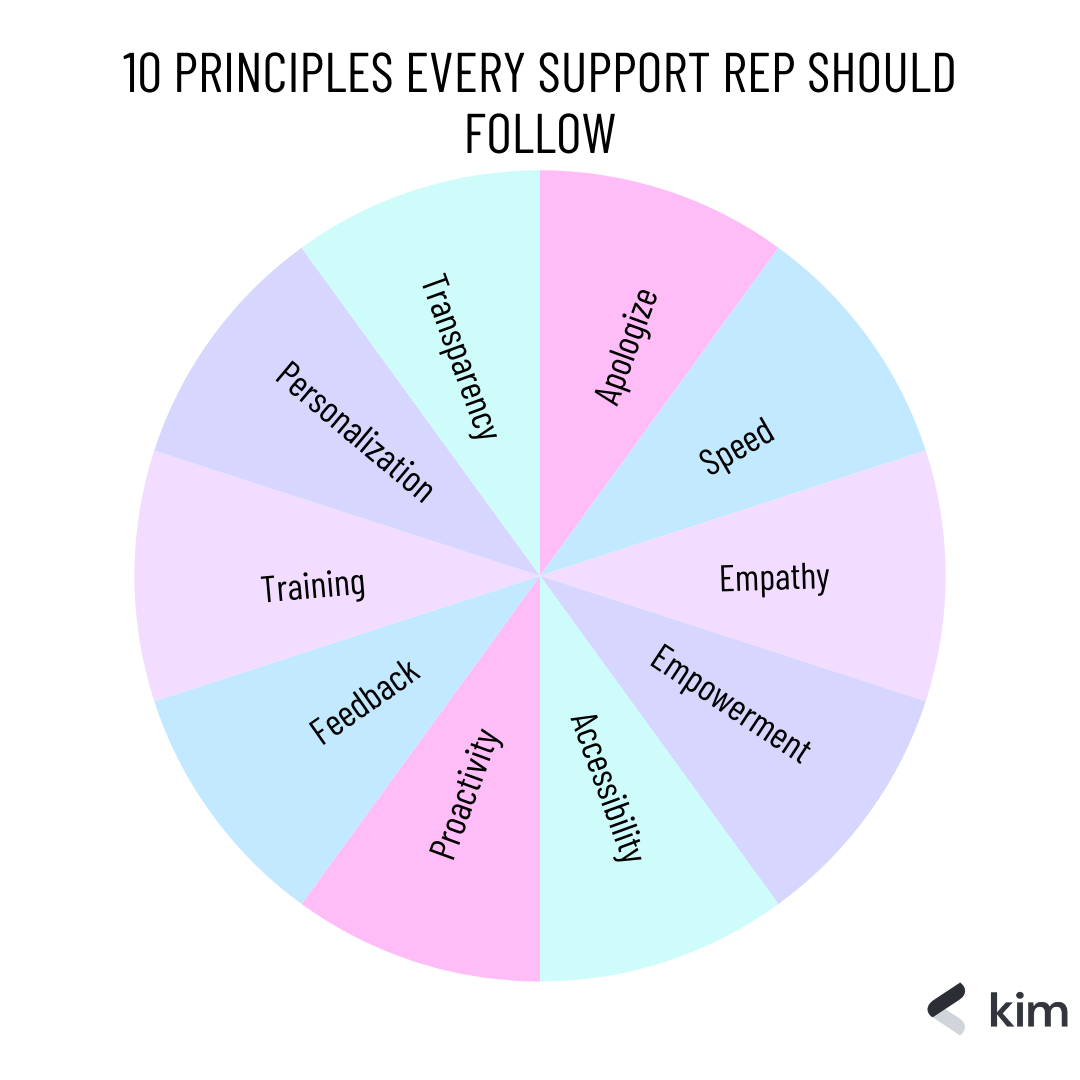10 Customer Service Principles Every Great Support Rep Should Follow

We all have principles in life, right? Some people live by “always be kind,” some by “never skip dessert,” and some by “don’t talk to strangers unless they have cookies.” Jokes aside, principles are what guide us, keep us consistent, and make us better versions of ourselves. Now, imagine applying that to business, especially to customer service.
Your company might have the best product, the coolest website, or even a viral TikTok campaign, but if your customer support is a mess, it can ruin everything. Think of it like baking a cake: no matter how fancy the frosting is, if the base is burnt, nobody’s eating it.
Your customer support team, agents, reps, or the superheroes behind the screens, is the backbone of your business. And just like you have personal ethics, there are guiding principles your customer service team should follow. They don’t just make your team better at their jobs; they make your customers happier, which leads to more loyalty, better reviews, and yes, more sales.
So, let’s dive into 10 key customer support principles that will take your business from “meh” to “legendary.”

1) Transparency and Honesty
Let’s be real, customers hate being lied to. Nothing kills trust faster than promising a product will arrive today when you know full well it’s delayed. You might think, “Eh, they’ll forgive us,” but that one white lie can spiral into a frustrated call or a viral tweet about your “nonexistent delivery.”
Being transparent might sting a little in the moment, but in the long run, honesty pays. Customers appreciate it when you say, “Hey, your order might be late due to XYZ,” instead of pretending everything is perfect. For example, Amazon often sends proactive updates if your package is delayed, and guess what? People don’t complain, they appreciate the heads-up.
Pro tip: Transparency works best when combined with a plan. Don’t just tell them it’s late; tell them what you’re doing about it.
2) Apologize
Even when it’s not your fault, a sincere “sorry” goes a long way. Think about it, if your coffee machine breaks on delivery, it’s not agent’s fault. But staying calm and apologizing prevents the situation from escalating.
Here’s a real-world example: Best Buy customer service agents are trained to apologize immediately if a customer is upset, even if it’s a shipping partner’s fault. And it works. A calm, empathetic apology can turn an angry rant into a satisfied customer.
Remember, it’s not weakness to apologize; it’s strength. Losing your temper or being defensive? That just turns a small issue into a full-blown saga.
3) Speed
Nobody likes waiting for two days to hear back that their refund will take 4–5 business days. Speed in responses is crucial, especially in today’s world where people expect instant gratification.
Tips for faster support:
- Use customer care software to track tickets
- Enable live chat support outsourcing for peak hours
- Invest in an AI virtual assistant to handle simple queries instantly
Speed might seem small, but it drastically improves customer service experience and CSAT scores over time.
4) Empathy
Gone are the days when just saying “Hi [Name]” made a difference. Today, competition is fierce, and customers want to feel genuinely cared for. Empathy means understanding your customer’s problem, sympathizing with their situation, and responding as if it were happening to you.
For example, if a customer complains that their new laptop from Best Buy isn’t working, a simple “I understand how frustrating this must be for you” makes them feel heard. It’s not just words; it’s tone, attitude, and genuinely putting yourself in their shoes.
Empathy is what separates good customer service from the best customer experience. It’s why companies like Zappos and Nordstrom have cult followings, they make customers feel human, not just a ticket number.
5) Empowerment
One of the biggest frustrations for agents is having to escalate every little thing. Empowering your team to make decisions reduces response times and increases satisfaction, for both agents and customers.
For instance, if an agent can issue a refund without waiting for a manager’s approval, the customer gets instant resolution, and the agent feels valued.
Empowered agents = happy customers = happy bosses <> Customer support math.
6) Accessibility
How easy is it for customers to reach you? If your contact info is buried under three menus, or if your FAQs are hard to find, you’re making life unnecessarily difficult for both customers and agents.
Tips for better accessibility:
- Highlight live chat support outsourcing options on the homepage
- Offer self-service with customer care software or Chat Desk tools
- Make sure your website search works flawlessly
Easy access = fewer frustrated customers, and that alone can skyrocket your customer service experience.
7) Proactivity
Don’t wait for the customer to scream. If you know there’s a potential delay, proactively reach out. This principle separates reactive support from truly best customer service.
Example: If a shipment is delayed, an agent can send an update saying, “We noticed your order might take two extra days due to weather. Here’s what we’re doing about it.” Customers appreciate that foresight.
Proactivity isn’t just about avoiding complaints; it’s about building trust and showing that you’re looking out for your customer. Companies like Amazon and Apple have mastered this by sending updates for delayed shipments or pending refunds. Learn how we match you with Shopify-trained VAs in under 48 hours to ensure your support team is always proactive and responsive.
8) Continuous Improvement
Every interaction is a chance to learn. Encourage agents to ask for feedback, review tickets, and improve their approach every day. Customer feedback isn’t just about satisfaction; it’s about evolution.
For example, using AI-powered virtual assistants can help track patterns, like common complaints about a product, and guide agents to improve responses. Over time, this continuous improvement strategy leads to better customer support remote operations, happier customers, and more efficient teams.
Even small improvements, like shortening email templates or improving FAQ answers, make a big difference.
9) Training and Knowledge
You can’t expect agents to deliver great customer service experience without proper training. Knowledge is power. Use customer care software to maintain an internal knowledge base, train new hires, and help experienced agents handle tricky situations.
This principle also ties into outsourcing. If you decide to outsource ecommerce customer service, make sure your partner trains agents well and equips them with proper tools.
If you’re looking for agents who are already trained, understand your processes, and can deliver exactly what you need, we can help.
10) Consistency and Personalization
Customers notice when experiences vary. Consistency builds trust, while personalization builds loyalty.
Take Chewy for example. Their support team remembers your pet and past purchases. They go the extra mile by sending handwritten cards, personalized gifts, or even sympathy flowers if a pet passes away. Every interaction feels thoughtful, consistent, and truly personalized.
Chewy has earned a reputation as a top CX company by combining dependable service with heartfelt personal touches, creating a customer experience that feels both reliable and uniquely attentive.

Even if you’re using AI customer service agents, personalization is possible. Advanced AI-powered virtual assistants can analyze past interactions to respond in a way that feels tailored, without making the customer feel like they’re talking to a robot.
Wrapping It Up
The takeaway is simple: customer support isn’t just a department, it’s a philosophy. By following these 10 principles (and yes, sprinkling in a bit of humor and humanity), businesses can create loyal customers, happier agents, and a reputation for best customer service.
Remember:
- Be transparent, honest, and empathetic
- Apologize without losing your cool
- Respond quickly, proactively, and consistently
- Empower your agents and give them the right tools
- Continuously improve and personalize experiences
And if you’re short on internal resources, you can always hire customer support teams, outsource ecommerce customer service, or invest in AI customer service software to help your business scale while maintaining excellent care.
At the end of the day, customers don’t just buy products, they buy experiences. Make that experience seamless, honest, and human, and you’ve got a recipe for success.
Ready to transform your support with agents who follow these principles.